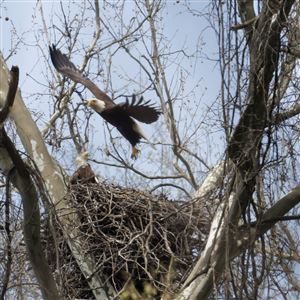An 11-year-old pit bull terrier was at the side of her owner when the man died in April in his Pittsburgh home. The man had adopted the dog from an animal shelter, and they had lived together -- just the two of them -- for nearly nine years.
They were able to stay together as home hospice workers cared for the middle-aged man during his long battle with cancer, but he worried about his dog. He didn't want her to go back to a shelter because she had lived most of her life in a house and because she doesn't like other dogs.
The man was relieved when a friend told him about Hello Bully, a nonprofit pit bull rescue organization, that agreed to take in his dog upon his death. Volunteers picked the dog up about an hour after the man died and took her to a "safe house" at an undisclosed location north of Pittsburgh.
They call her Isis, and she lives in a bedroom -- not a kennel -- in a house where volunteers will care for her until a permanent home can be found. Not many pit bulls are as lucky as Isis because Hello Bully is a very small organization, with only three dogs currently in its care.
Animal shelters and rescue groups as well as hospice employees, volunteers and social workers see pets like Isis all the time. Owners develop serious health problems and no longer can care for their dogs or cats. When pet owners die, relatives and friends frequently are unwilling or unable to take in their pets. Often the pets of older people are older animals -- like 11-year-old Isis -- and that makes them less adoptable.
All pet owners, regardless of age, should make advance plans for beloved pets that may outlive them, everyone interviewed for this story agreed.
No one, big "safety net" group steps in when a pet owner dies, but organizations are working to create new programs and expand existing efforts. Social media is part of the solution -- websites, Facebook pages and email "distribution lists" send out emotional appeals for dogs such as Sheba.
Shortly before Christmas, pictures of the sad-eyed, black dog made the rounds of email lists in the Pittsburgh area and beyond.
"Sheba remembers home. She had a home where she was loved until her elderly guardian became ill and unable to care for her. Now, at the age of 10, Sheba waits and hopes to go home again. She grieves for the life and home she knew," said the post on the local list of financial planner Robert Fragasso, who is well-known in animal rescue circles.
Every day he sends out dozens of emails to more than 200 people, and many are "cross-posted" to lists all over the country.
"Hundred of animals get new homes" through the emails, said Mr. Fragasso, who has been on the board of the Animal Friends shelter in Ohio Township for 20 years.
Sheba's post originated with Lori Baltich, rescue coordinator at the Brooke County shelter in northern West Virginia. The 36-pound Labrador retriever/shepherd mix is only 45 minutes from Pittsburgh, said Ms. Baltich, who is thrilled that Sheba ended up on the highly effective email lists of Mr. Fragasso and the Animal Advocates rescue group in Pittsburgh's West End.
Sheba was a puppy when an older man adopted her from the small, rural shelter. When the man died in the spring, Sheba was brought back to the shelter.
"Dogs should not have to die because their owner passed away," Ms. Baltich said. "But a shelter is very hard for dogs that have been in a home. They grieve. When people die, the family is in turmoil. Often, no one steps up for these dogs and cats. If you could see the faces of these dogs ... they do not know where their person is."
"Sheba has a gray face, but she has a heart of gold, acts like a puppy and adores people and dogs," Ms. Baltich said.
Interested people may call her at 304-670-7756.
Lifesavers Society
Animal Friends has admitted 16,263 animals since 2006, including 54 dogs and 25 cats who arrived because an owner had died. Another 216 pets were surrendered due to an "owner problem," which includes health issues. Animal Friends is a no-kill shelter, and the waiting list to get in is months long.
The board of directors, including Mr. Fragasso, last week agreed to step up promotion and implementation of the shelter's Lifesavers Society. A pet owner who donates $5,000 to Animal Friends is guaranteed that when the owner dies, the shelter will take in the person's dog or cat, give it appropriate veterinary care and find it a permanent home.
The board has firmed up a commitment that "no animal in the Lifesavers Society will experience euthanasia due to health problems," he said, "and we are beefing up our inhouse veterinary capability."
Lifesavers Society has existed for several years, Mr. Fragasso said, but not many people know about it. Only "a few animals" have benefitted from it so far, he said.
"Ideally we would like to know in advance" that a pet will be coming in, Mr. Fragasso said, so that shelter workers would know about any special health and diet needs, "but that's not necessary." If a pet owner is terminally ill, the owner could pay in advance or a surviving relative could pay when the animal comes into the shelter.
Information: Pat Hargest, 412-847-7000.
Long-term pet planning
What kind of arrangements does a professional financial planner make for his own pets?
Mr. Fragasso said he and his wife, Janine, will leave $5,000 for each of their pets, including Baron, a black Labrador retriever they adopted through an email list because the owner had serious health problems and no longer could care for the dog.
"You need a backup," advised Mr. Fragasso, who said his pet financial plans will be administered by family, friends or Animal Friends.
A person can't legally leave money for a pet in a will because animals "are not people. They are tangible property," said attorney Douglas DeNardo, chairman of the Tax, Trusts and Estate Group at Rothman Gordon PC.
In 2006, Pennsylvania adopted the Uniform Trust Act, a section of which allows people to create a financial trust for their animals. A friend or relative can be designated to care for a pet, using money left in the trust.
"The downside to a trust is it's a separate tax-paying entity, and there is an administrative cost" that is usually about 1 percent of the trust, Mr. DeNardo said. The trustee is usually a lawyer or bank. If a small amount of money is left to care for a pet, it may be less expensive for many people to have friends or relatives handle it.
The Animal Friends Lifesavers Society "is really a very nice option for people to explore," Mr. DeNardo said.
"Do-it-yourself" wills that state your wishes on who will care for your pet "are enforceable," he said, noting that one will that held up in Pennsylvania was written on the back of a cigarette carton. "If you do research, you can probably do [a will] yourself," Mr. DeNardo said, "but you run the risk of leaving something out."
Pet Peace of Mind
When a hospice nurse pointed out that patients become withdrawn and depressed when their pets are given away, Family Hospice & Palliative Care became the first hospice in Pennsylvania to participate in a national program called Pet Peace of Mind.
About 30 local volunteers help care for the pets of patients of Family Hospice & Palliative Care, which serves clients in nine counties and has an inpatient facility in Mt. Lebanon. Twelve families have benefitted from the service. The most frequent request is for dog walking, but volunteers also feed pets and take them to veterinary and grooming appointments.
A grant from the Banfield Charitable Trust got the program up and running. The goal of that national trust, which partners on some projects with Banfield Pet Hospitals, is to help keep people and their pets together.
When the program for Family Hospice Family Hospice & Palliative Care was announced in the summer of 2011, there was no problem attracting volunteers.
"This really seems to speak to people," said Nick Petti, manager of volunteer services. "It's one less thing for the family to worry about."
Volunteers include professional trainer Marty Sheets, who conducts a daylong training session for volunteers.
Mary Salzman of Peters regularly walks a special dog named Star. The black Labrador retriever is a trained assistance dog for a hearing-impaired woman who spends much of her time caring for her husband, a home hospice patient.
"When I pull into the driveway, Star is at the door waiting for me," Ms. Salzman said.
Three volunteers are assigned to Star, taking turns to make sure she gets a walk every day.
"When I read about this program in a local paper, it sounded fabulous -- helping somebody as they go through the end of life," said Ms. Salzman, an animal lover who shares four cats with her husband.
Family Hospice is extremely animal-friendly. Seven certified therapy dogs make regular visits to the Mt. Lebanon facility. Family members are encouraged to bring the dogs of patients in for visits.
And Ivan, 5, a golden retriever and certified therapy dog "works" full time at the facility, visiting patients and their friends and relatives. He goes home on nights and days off with CEO Rafael Sciullo.
"Ivan fits into our whole mission of compassionate care," said Greg Jena, manager of marketing and public relations.
More volunteers are always needed. Call Mr. Petti at 412-572-8806.
Hearts and Paws
At least three or four times a week, Joe Hirsch gets a telephone call or email about a cat whose owner has died or a dog whose owner is going to hospice care. He is chairman of the Hearts and Paws pet ministry at Christ United Methodist Church in Bethel Park.
Church volunteers work with Animal Advocates and other animal rescue groups as well as with Family Hospice & Palliative Care in Mt. Lebanon to try to meet the needs of people and their pets.
The volunteers, including Mr. Hirsch and his wife, Carol, walk dogs for those in need and go to homes to feed pets and tend to them.
"We see pets when the people are in crisis," Mr. Hirsch said. "Most of these pets end up in shelters. The biggest problem is people don't do any advance planning."
Mr. Hirsch, 69, and his wife "have taken out a life insurance policy for our cats." The policy names the cats as beneficiaries of a policy that will be administered "by two rescue groups that we trust. I am the only person I know who has done this."
Helping pets and people
People who love their pets often are reluctant to leave their homes -- and thus their animals -- to go to hospitals, rehabilitation centers, hospice care or emergency shelters for victims of domestic violence.
The Human Services Center in New Castle decided to do something about that.
The Lawrence County agency, which primarily provides mental health services, converted a barn on the property of an inpatient mental health facility into an emergency short-term kennel to care for pets. Under supervision by staff, 11 clients currently living in the mental health facility care for the animals and exercise them.
The arrangement has proved to be a pleasant and therapeutic activity for the clients, said Jessica Strong, a project consultant.
The program got its start in April with a $10,000 grant from the Banfield Charitable Trust, she said. Although the Human Services Center primarily provides mental health services, the kennel is open to anyone who needs it.
About a dozen animals have used the service so far, including two cats owned by a single mother whose home burned. "That's fewer animals than we expected," Ms. Strong said.
Information: 412-908-0875.
First Published: January 17, 2013, 10:00 a.m.















